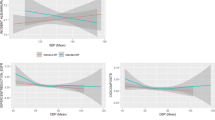Abstract
Purpose of Review
To review the impact of the Systolic Blood Pressure Interventional Trial (SPRINT) on renal function and chronic kidney disease.
Recent Findings
Hypertension is a risk factor for cardiovascular and kidney outcomes in patients with chronic kidney disease (CKD). The benefits of intensive blood pressure lowering in the CKD population in previous studies are unclear. The SPRINT compared standard (< 140 mmHg) and intensive (< 120 mmHg) blood pressure management in nondiabetic patients with high risk of cardiovascular disease. In the subgroup of patients with CKD, the most important finding was that intensive blood pressure lowering is associated with lower risk of cardiovascular disease and mortality. Other than lower levels of albuminuria, there was no benefit on clinical kidney outcomes with the intensive treatment group. The risk of incident CKD and episodes of acute kidney injury was higher in patients in the intensive treatment group, though most patients with acute kidney injury recovered kidney function.
Summary
While the benefit of intensive blood pressure lowering on cardiovascular events and mortality with intensive blood pressure lowering is clear in patients with CKD, longer term follow-up may be needed to fully understand the effect on kidney function.
Similar content being viewed by others
References
Papers of particular interest, published recently, have been highlighted as: • Of importance
Qureshi S, Lorch R, Navaneethan SD. Blood pressure parameters and their associations with death in patients with chronic kidney disease. Curr Hypertens Rep. 2017;19(11):92–017. –0790-6
Toto RD, Mitchell HC, Smith RD, Lee HC, McIntire D, Pettinger WA. “Strict” blood pressure control and progression of renal disease in hypertensive nephrosclerosis. Kidney Int. 1995;48(3):851–9.
Klahr S, Levey AS, Beck GJ, Caggiula AW, Hunsicker L, Kusek JW, et al. The effects of dietary protein restriction and blood-pressure control on the progression of chronic renal disease. Modification of Diet in Renal Disease Study Group. N Engl J Med. 1994;330(13):877–84.
Wright JT Jr, Bakris G, Greene T, Agodoa LY, Appel LJ, Charleston J, et al. Effect of blood pressure lowering and antihypertensive drug class on progression of hypertensive kidney disease: results from the AASK trial. Jama. 2002;288(19):2421–31.
James PA, Oparil S, Carter BL, Cushman WC, Dennison-Himmelfarb C, Handler J, et al. 2014 evidence-based guideline for the management of high blood pressure in adults: report from the panel members appointed to the Eighth Joint National Committee (JNC 8). Jama. 2014;311(5):507–20.
Chobanian AV, Bakris GL, Black HR, Cushman WC, Green LA, Izzo JL Jr, et al. The Seventh Report of the Joint National Committee on Prevention, Detection, Evaluation, and Treatment of High Blood Pressure: the JNC 7 report. Jama. 2003;289(19):2560–72.
• A randomized trial of intensive versus standard blood-pressure control. N Engl J Med. 2015;373(22):2103–16. This trial highlighted the importance of reduction in blood pressure goals to improve cardiovascular outcomes.
Ambrosius WT, Sink KM, Foy CG, Berlowitz DR, Cheung AK, Cushman WC, et al. The design and rationale of a multicenter clinical trial comparing two strategies for control of systolic blood pressure: the Systolic Blood Pressure Intervention Trial (SPRINT). Clin Trials (London, England). 2014;11(5):532–46.
• Cheung AK, Rahman M, Reboussin DM, Craven TE, Greene T, Kimmel PL, et al. Effects of intensive BP control in CKD. J Am Soc Nephrol : JASN. 2017;28(9):2812–23. This paper focuses on the CKD population of SPRINT and the improvement in cardiovascular outcomes within both treatment arms and the lack of difference in main kidney outcomes between treatment arms.
• Beddhu S, Rocco MV, Toto R, Craven TE, Greene T, Bhatt U, et al. Effects of intensive systolic blood pressure control on kidney and cardiovascular outcomes in persons without kidney disease: a secondary analysis of a randomized trial. Ann Intern Med. 2017;167(6):375–83. This paper focuses on the non-CKD population of SPRINT and the impact of blood pressure lowering on renal outcomes.
Obi Y, Kalantar-Zadeh K, Shintani A, Kovesdy CP, Hamano T. Estimated glomerular filtration rate and the risk-benefit profile of intensive blood pressure control amongst nondiabetic patients: a post hoc analysis of a randomized clinical trial. J Intern Med. 2018;283(3):314–27.
• SRocco MV, Sink KM, Lovato LC, Wolfgram DF, Wiegmann TB, Wall BM, et al. Effects of intensive blood pressure treatment on acute kidney injury events in the Systolic Blood Pressure Intervention Trial (SPRINT). Am J Kidney Dis. 2017;71(3):352–61. This paper summarizes the effect of blood pressure reduction with increased acute kidney injuries.
Weiner DE, Gaussoin SA, Nord J, Auchus AP, Chelune GJ, Chonchol M, et al. Cognitive function and kidney disease: baseline data from the Systolic Blood Pressure Intervention Trial (SPRINT). Am J Kidney Dis. 2017;70(3):357–67.
Genovese G, Friedman DJ, Ross MD, Lecordier L, Uzureau P, Freedman BI, et al. Association of trypanolytic ApoL1 variants with kidney disease in African Americans. Science (New York, NY). 2010;329(5993):841–5.
Freedman BI, Rocco MV, Bates JT, Chonchol M, Hawfield AT, Lash JP, et al. APOL1 renal-risk variants do not associate with incident cardiovascular disease or mortality in the Systolic Blood Pressure Intervention Trial. Kidney Int Rep. 2017;2(4):713–20.
Langefeld CD, Divers J, Pajewski NM, Hawfield AT, Reboussin DM, Bild DE, et al. Apolipoprotein L1 gene variants associate with prevalent kidney but not prevalent cardiovascular disease in the Systolic Blood Pressure Intervention Trial. Kidney Int. 2015;87(1):169–75.
Funding
This study was supported by a grant from the National Institutes of Health.
Author information
Authors and Affiliations
Corresponding author
Ethics declarations
Conflict of Interest
Dr. Rahman reports grants from NIH, during the conduct of the study; Dr. Wells declares no conflicts of interest relevant to this manuscript.
Human and Animal Rights and Informed Consent
This article does not contain any studies with human or animal subjects performed by any of the authors.
Additional information
This article is part of the Topical Collection on Mechanisms of Hypertension
Rights and permissions
About this article
Cite this article
Wells, R., Rahman, M. SPRINT and the Kidney: What Have We Learned?. Curr Hypertens Rep 20, 95 (2018). https://doi.org/10.1007/s11906-018-0895-6
Published:
DOI: https://doi.org/10.1007/s11906-018-0895-6




